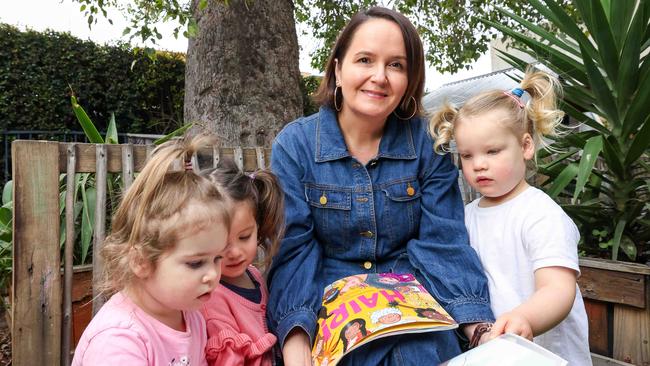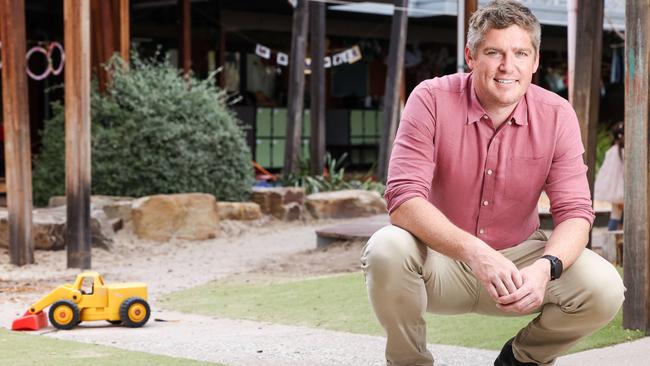New measures bring positive changes for South Australian children
The State Government has introduced new early childhood development reforms to give every child their best start.

SA News
Don't miss out on the headlines from SA News. Followed categories will be added to My News.
Sweeping early childhood development reforms will give South Australian youngsters a better start in life – while providing greater opportunities for more people to discover the joys of working with children.
That’s the opinion of Australian Childcare Alliance SA president Jackie Jackman, who says the SA Government’s commitment – a $715 million investment over five years to implement universal three-year-old preschool and other key recommendations of the Royal Commission into Early Childhood Education and Care – will bring “positive changes”.
“Since the Royal Commission delivered its findings and recommendations, operators have been waiting to see what changes would be made and how this would impact the sector,” she says. “We are thrilled about the significant investment and the roll-out pattern for the three-year-old preschool, which provides long day care with a reasonable time frame to adjust to the changes and the implementation.”
A registered early childhood teacher, Jackman is also the approved provider of Treetops Early Learning Centres, which operates five purpose-built centres in Adelaide. Her passion for children’s education has always been centred on the early years.
“Teaching, nurturing and aiding in children’s development from birth has always been very important to me – even more so when I became a mother to my now six and 10-year-old daughters,” she says. “In the ever-changing environment of early learning education, every day is different, sometimes challenging but inspiring.
“I continue to learn new skills and feel fortunate to contribute to educating and developing the children in our care. I deeply understand early childhood education’s profound and enduring impact on a child’s development and have long advocated the importance of early childhood education.”
The first few years of life are critical for a child’s optimal learning and development. “Children who engage in play-based learning develop valuable knowledge and skills that prepare them for a lifetime of learning and developmental outcomes,” Jackman says.
“Enrolment in early childhood education and care programs has positive short and long-term effects on our children. Children develop respectful relationships with both children and adults, independence, confidence, and self-worth. They also gain a sense-of-school readiness, all while doing it in a nurturing, caring environment with the guidance and support of the educators.”
Jackman says it is crucial for more trained educators to become involved in helping guide children along the first steps of their formal school journey. “I strongly agree with the priority of investing in growing and supporting the early childhood workforce in preparation for the three-year-old preschool delivery,” she says. “The workforce strategy being implemented is highly positive, encouraging and exciting to educators currently in the sector.
“It is also appealing to people looking to enter our sector. In particular, there are financial support programs for new workers looking to engage in early years’ education training or existing educators looking to upskill.” This support will continue with mentor support, coaching and professional development being offered for teachers and educators.
Jackman is also happy to see the overall dedication and support for this strategy to grow the Aboriginal early childhood workforce.
Other steps include a Teachers Registration Board amendment to include three-year trained early childhood teachers; the development of new university degrees in line with the amendment; and the establishment of the TAFE Centre of Excellence in Early Childhood Education and Care, offering workers training, courses and pathways into the sector. “This is also bolstered by the recent announcement that the Australian Government has committed to a fully-funded 15 per cent pay rise over two years,” Jackman says. “This also shows educators how valued and respected they are within the community.”
Excellence driving sector forward

A joint Federal and State Government investment will see South Australia become a national skills leader in early childhood development.
The $28 million Early Childhood Education and Care TAFE Centre of Excellence (CoE), based at TAFE SA’s Adelaide metropolitan campus, will drive innovation within the sector, using research and training to improve the skills and capability of early childhood education and care workers on a national scale.
Initial planning is under way with a focus on sector priorities including working with sector experts to develop and pilot professional development programs; providing innovative training and fast tracking the development and delivery of higher and degree-equivalent apprenticeship pathways; building a framework for Closing the Gap through courses co-designed with First Nation communities; and developing content to help early childhood educators work with children with autism.
“Through the CoE we will be looking at new ways of delivering training programs and some of that will be in workplace settings,” TAFE SA director Nick Howie says. “The learning resources, methodologies and frameworks developed by the CoE will be rolled out and piloted by our educational program areas, delivering to our existing student cohorts with an idea of increasing capacity by changing the way we do that delivery.
“Being a TAFE CoE, we are not just delivering and developing for TAFE SA – we will be working through a national TAFE network to distribute the resources and new ways of working, and helping other TAFEs implement those across the country.”
In response to the Royal Commission into Early Childhood Education and Care and the State Government’s response to introduce universal preschool for all three-year-olds, the CoE will also work to attract and retain more qualified early childhood educators and teachers to the sector. The CoE will leverage training partnerships with industry, universities, Jobs and Skills Councils and unions, facilitating alternative pathways into the sector to strengthen employment pipelines.
“We have plans to look at pre-entry programs that will help people make informed decisions on their pathways,” Howie says. “We hope that will improve retention of student cohorts, with more people finishing their studies and moving into jobs because they know what they’re in for before they start their training.”
For existing employees, short courses for professional development will ensure they stay up to date with sector developments, as well as opportunities for staff to upskill to diploma-level qualifications while continuing their employment.
“We will also be looking at the vocational education sector more broadly so we can build solutions for the whole training sector,” Howie says.
“We are partnering with universities to look at pathways between vocational education and higher education programs, get further recognition for vocational education programs into bachelor-level qualifications and look at where more practical hands-on experience can be incorporated into bachelor-level programs.”
Funding opens doors to study

Courtney Nicolas can’t wait to begin her career as a kindergarten teacher.
The mum of two began studying a Bachelor of Early Childhood Education (Birth to Eight) at UniSA in 2019, balancing her part-time studies with work in a learning and behaviour unit and family life. However, the recent introduction of a Bachelor of Early Childhood Education (Birth to Five) means she can fast-track her studies and be qualified to work in 2026.
“I’m really excited about that,” she says. “This change in the course has been a great opportunity.”
Nicolas’s studies have been made possible by a grant from the State Government, which offers financial support to South Australian residents studying Australian Children’s Education and Care Quality Authority (ACECQA) eligible early childhood qualifications and who intend to work as a teacher in the state’s early childhood sector.
Students undertaking bachelor degrees can access up to $25,000 to offset costs related to their study, while masters degree students are eligible for up to $17,000. Nicolas heard about the opportunity through UniSA.
“I’ll be getting about three years of financial support,” she says. “It goes towards every year of your degree and also the early years of joining the workforce, so even after I finish my degree I will get support in my first year of teaching, which is amazing.”
Nicolas believes the State Government grants are a great opportunity to help those who want to work in the field of early childhood education and care. “It’s an incredible incentive that is going to help so many people. I grew up in the country and I think this financial support will help people from regional areas as well.”
As a parent herself, Nicolas is enthusiastic about the introduction of three-year-old preschool for all South Australian children. “Families will be able to connect earlier and build a strong network, which will be particularly helpful for those with limited family support,” she says. “There will also be more opportunities for early intervention and picking up on developmental and language delays. It’s going to be such a good thing for children.”


